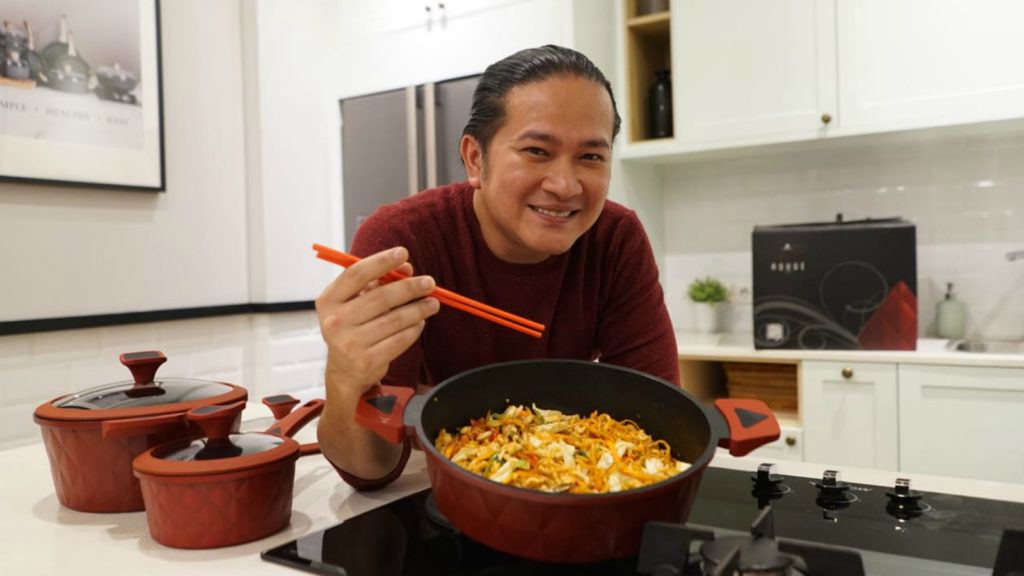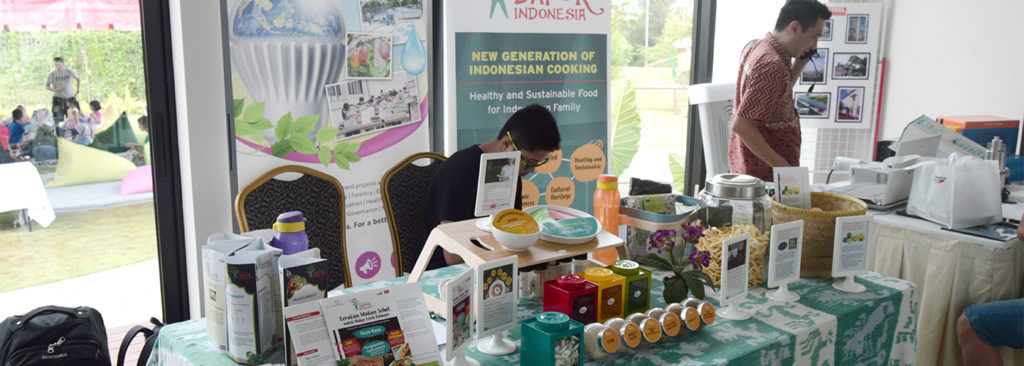Connecting sustainable food movers and shakers in Bandung City
Indonesia is home to healthy food options that, if promoted, would not only make food cheaper, but also improve the nations’ health. A key part of the solution? Many different guests at the table.
The gastronomic movement in Bandung
Any successful multi-stakeholder platform requires committed participants to lead its activities. And in an urban context, you need local city actors to make it work and become sustainable. The Hivos program Generasi Baru Dapur Indonesia (GBDI), or “New Generation of Indonesian Cooking” (NGIC) platform in Bandung City, West Java, shows how to successfully build coalitions of city actors around something like gastronomy no less, both in Indonesia and internationally.
Our NGIC program is a gastronomic movement that aims to stimulate sustainable food consumption in Indonesia by actively involving chefs, restaurants, catering businesses and food service providers. The NGIC’s goals are: quality, great taste, cultural heritage, affordability, fun, health and sustainability.
NGIC is modern and hip, offering great experiences based on Indonesia’s rich ethnic gastronomic heritage. The desired end result is of course healthier cooking practices and an increased demand for sustainable ingredients. With NGIC, we target unconscious consumer behavior by enticing people with delicious food and images of a modern lifestyle. Bandung, the capital of West Java province, was selected as the first pilot site due to its strong culinary heritage and enabling “creative” environment.
The NGIC has further built on the experiences from the 2017 Hivos and IIED-led Food Change Labs to become what it is today. And since 2017, Hivos has helped connect the NGIC to Bandung stakeholders through various workshops and campaign events about healthy and sustainable food.
We have a duty to educate people on how to cook with healthy local ingredients and respect nature at the same time.
Key members of our NGIC platform include: representatives of varying levels from the Bandung city government (including health, food & agriculture, and regional planning agencies); a large group of private sector companies (urban farming, retail, food service); as well as citizens’ associations and NGOs.
Education will unleash a food revolution
To get people in Bandung to reconsider and change their food choices through gastronomy, we regularly enlist the aid of famous TV chefs. The TV chefs help promote sustainably produced, healthy local foods that people can make themselves. Two of the notable chefs are Chef Chandra Yudasswara and Chef Petty Elliott. Chef Yudasswara is a host of Chef’s Table, and is one of the few TV chefs in Indonesia who talks about healthier diets. He also offers healthy options on his menus and provides basic information about sustainability during his shows. Chef Petty Elliot appeared on Indonesian TV as a judge on Iron Chef. She collaborates with a sustainable local food producer and mentors young farmers. Elliot: “We have a duty to educate people on how to cook with healthy local ingredients and respect nature at the same time.”
Since TV chefs have grown in popularity globally, including in Indonesia, they can greatly influence human behavior and the way people think about how or what to cook and how to feed themselves. This is why the NGIC uses their star power as a valuable tool for educating people and changing their food consumption patterns.
Inspired by NGIC
Our work through NGIC has sparked other actors into action. For instance, on June 1, 2018, three prominent players in the Bandung food sector agreed to lead two working groups. The Center of Sustainable Food Studies (CSFS) of the University of Padjajaran, 1000 Gardens Community, and the Bandung chapter of Catering Industry Association (APJI) are all important social actors and also actively participate in in the Bandung Sustainable Food Consumption and Production (SCP) initiative. This initiative operates together in partnership with academia and the private sector, including SME (Small and Medium-sized Enterprises) producers and retailers in the food service industry.
The CSFS is the prominent knowledge institution in Bandung on sustainable food. The 1000 Gardens Community is a group of small-scale producers and retailers who promote local food production and consumption, including urban farming. And APJI Bandung is an association of catering and culinary services in the city playing a strategic coordination role in mainstreaming the SCP initiative.
The CSFS agreed to lead the training and education working group, while 1000 Gardens Community and the APJI agreed to lead the Implementation working group.
A trailblazing model
The NGIC has been very active in Bandung, and its success has enabled Hivos’ Sustainable Diets for All program to strengthen its own track record in the food sector in Bandung and globally. For example, NGIC was invited to represent Indonesia at the EAT Food Forum in Sweden in June 2018. This means that NGIC is gaining recognition at the global level as an innovative model for promoting sustainable food consumption via the gastronomy sector.
Additionally, the UK’s Chatham House collaborated with Hivos’ NGIC to host workshops in Jakarta and Bandung on the topic of the circular economy in the Indonesian food sector. The NGIC was used as a case study in Chatham House’s research and for discussion in their workshops. Workshop participants concluded that the Indonesian food sector can – and should – lead the way towards building a circular economy in Indonesia, with NGIC as the trailblazing model.
As of 2019, the NGIC also contributes to Hivos’ the Switch Asia Local Harvest program. This program promotes the production and consumption of local, healthy, fair and green food in four other cities and fourteen districts throughout Indonesia, demonstrating that NGIC’s model and approach are replicable.
NGIC Circular Economy workshop at Javara restaurant, Jakarta, May 2018. Photo: NGIC


